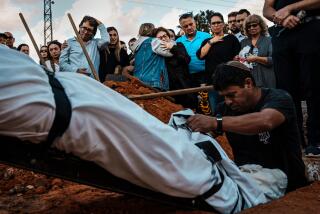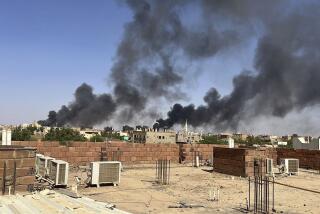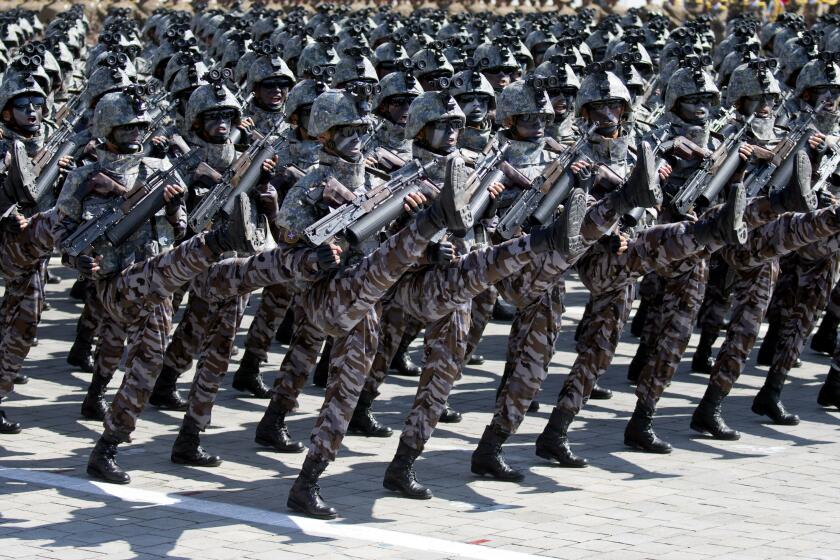Power Vacuum Contributes to E. Timor’s Woes
DILI, East Timor — The stench registers first, then the insects, then the air of abandonment. Only later does the full horror of the sight sink in: 10 charred skeletons in the back of a white pickup truck a few yards from a main road.
Those remains were found here Wednesday just outside East Timor’s main airport. The truck was parked to appear, at a quick glance from the road, like just another junked car.
No one is ever likely to know what acts of barbarity preceded the bid to burn the vehicle and its contents beyond recognition. But that rather clumsy effort couldn’t mask the jumble of skulls, sinew and burned flesh left decomposing in the truck’s bed under a searing tropical sun.
A few more bodies in this deeply troubled land. A few more slayings carried out with apparent impunity. Another sign that the international community is tied in jurisdictional knots as the evidence of atrocities in East Timor mounts.
“[These cases] are popping up all over the place,” said U.N. spokesman David Wimhurst. “We urgently need to see an expert or a group of experts on the ground who can do a systematic investigation of all these findings.”
So far, though, there isn’t a single forensic specialist here to read the killers’ calling cards. And the rainy season is fast approaching, with its power to accelerate decomposition and melt away evidence.
Furthermore, the United Nations has no mandate to prosecute anyone who committed crimes against East Timor’s people.
The Indonesian military and pro-Indonesian militias began wreaking a deadly revenge after the East Timorese voted overwhelmingly in favor of independence from Indonesia in a U.N.-sponsored plebiscite Aug. 30.
Indonesia finally agreed to allow an international peacekeeping force into the territory, which it has long claimed as a province, but the government in Jakarta, the Indonesian capital, has fought aggressively against an international human rights investigation in East Timor, arguing that any crimes that may have occurred were not the result of a coordinated government policy but the work of rogue individuals.
The U.N. Human Rights Commission voted 27 to 11 on Monday, with three abstentions, to establish a commission of inquiry to investigate human rights violations in East Timor, a first step toward a possible U.N. war crimes tribunal for the territory.
Indonesian Ambassador Hassan Wirajuda, however, quickly dismissed the vote as nonbinding and said Indonesia’s own investigation was the “best way to proceed to protect its national interest.”
The crux of this jurisdictional impasse, experts say, is that East Timor is now something of a no man’s land. While Indonesia has continued to claim nominal control of the territory, it has been unwilling or unable to exercise it. And while the U.N.-sanctioned peacekeepers have the power to exert their authority, they lack the orders.
“It’s a classic legal ambiguity,” said an international legal expert knowledgeable about the impasse. “It’s desperately sad to be in that position, but it’s the reality.”
Western diplomats in New York, Geneva and Jakarta are working feverishly to strengthen the U.N. mandate in East Timor and persuade Indonesia to allow more international monitoring of human rights violations, officials say. Still, many expect Indonesia to retain its authority as long as it can, raising the prospect of a protracted standoff.
In another twist, U.N. rules for East Timor allow peacekeeping forces to hold suspects for only 72 hours, no matter how horrific their alleged crimes, at which point the detainees must be turned over to the Indonesian police. Most Indonesian police, however, have left East Timor. U.N. officials say there are only seven Indonesian police officers in this territory the size of Vermont, along with about 50 members of another, more militaristic police force. Even when Indonesian police were here in force, officials say, all too often they simply turned around and released suspected criminals.
These days, in practice, the U.N.-approved force, too, just lets detainees go.
“Some detainees are arrested and released without a trial because we have no system here for a trial,” Lt. Col. Drew Braban, chief legal officer with the Australian-led force, told reporters.
For Jose Ximenes, a 22-year-old East Timorese student who went Wednesday to see the bodies near the airport for himself, the U.N.’s weak prosecution record, along with its failure to anticipate the postelection violence and the delayed arrival of the U.N.-sanctioned forces in East Timor, has been costly.
“We are angry,” said Ximenes. “The multilateral force waited two weeks, and now many people are dead.”
The area near the airport where the bodies were found Wednesday is a large field filled with two dozen rusted vehicles. The bodies found in the back of the white truck lay in a range of awkward positions, some curled in the fetal position, others jumbled together in bunches, one with its head turned down into the corner of the cab. By the looks of it, they had been there more than a week.
“Judging from other cases, I’d say [the victims] were singled out for whatever reason, executed, then driven out here in the vehicle and burned,” said Maj. Dan Crogan, a civilian police officer with the U.N. mission in East Timor.
In a drainage ditch a mile or so closer to downtown Dili, meanwhile, another body floated in the shallow water Wednesday, just a few hundred feet from a looted Toyota dealership. The corpse was largely submerged, except for a discolored foot. Pink bougainvillea flowers and small Indonesian currency notes floated beside it, offerings left by neighboring residents.
“As Timorese, we always feel sad if any single one of us is killed,” said Guido Alpes, a 19-year-old neighbor, who said the body had been in the ditch since at least Sept. 9, when he returned from hiding.
And on Monday, the U.N. said six bodies believed to be victims of pro-Indonesian militias had been found in two separate graves on the outskirts of Dili, the territorial capital.
As the U.N. force gradually expands its control after 10 days on the ground, more and more evidence of atrocities is likely to emerge, officials say.
U.N. spokesman Wimhurst says at least 14 bodies have been found and several sites identified but not yet investigated, bringing the total body count to about 30.
“That’s just what’s happened in Dili with no systematic investigation,” he said. “Who knows what they’ll find in the outlying areas.”
The rampant looting and burning of Dili and the complete breakdown of social order in East Timor mean that there isn’t even a morgue to store bodies worth investigating.
U.N. officials say all they can do is record the deaths and hope that at some point Indonesia relents under international pressure and permits an investigation.
In the East Timorese town of Col, peacekeeping troops staged an attack Monday night after receiving intelligence that militias were operating in the area. Using Black Hawk helicopters and night-vision scopes, the force captured 15 members of the Alpha militia group, AK-47 and SKS automatic assault weapons, swords, knives and grenades. It was the first significant militia cache seized in the territory. The incident took place without shots being fired by either side.
Even if the detainees are deemed suspects in atrocities, however, the U.N. must release them by Friday, unless the East Timor mandate is expanded before then.
More to Read
Sign up for Essential California
The most important California stories and recommendations in your inbox every morning.
You may occasionally receive promotional content from the Los Angeles Times.










